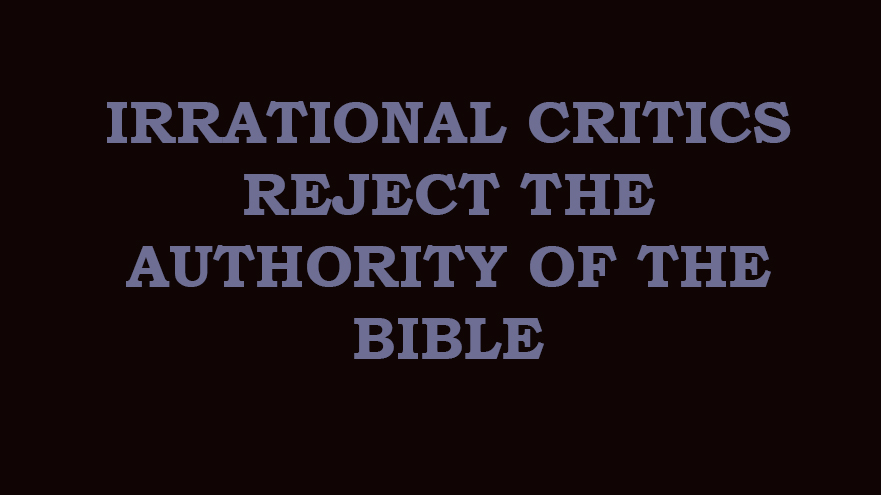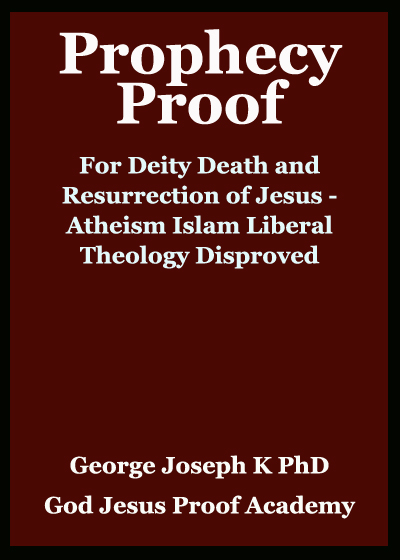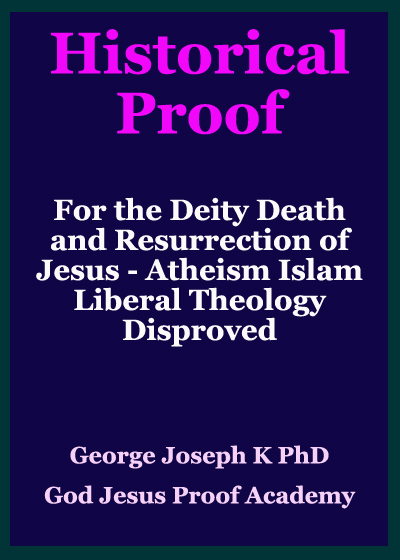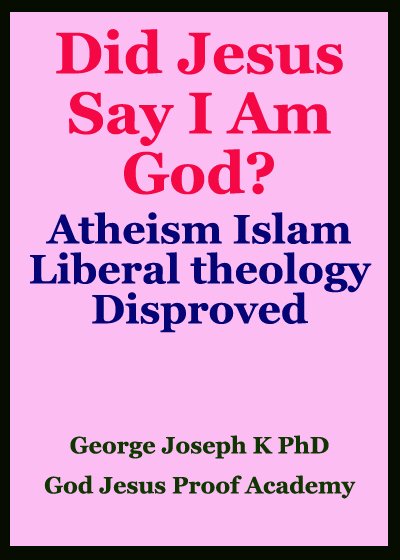
IRRATIONAL CRITICS REJECT THE AUTHORITY OF THE BIBLE
Whereas previous generations had seen the Bible as the ultimate practical authority for the Christian, Liberalism made authority wholly subjective based on individual spiritual experience. Ultimate authority was not to be found in any external source, Bible, Church, or tradition, but on the individual’s reason, conscience and intuition. The Bible became the record of man’s evolving religious conceptions.
The rise of Biblical criticism in the mid to late nineteenth century represented a wholesale attack on the Sola Scruiptura foundation of the Protestant faith and the theology of the post-Reformation period which had articulated a precisely defined doctrine of inerrancy. In some of these explanations the doctrine of inspiration and inerrancy was extended even to the vowel pointing of the Hebrew text. The biblical critics blasted such doctrines.
The rise of textual criticism shook the confidence of many as to the accurate transmission and preservation of the text. Literary (Higher) higher criticism applied to the Bible the methods of literary analysis used in secular documents. However the critics looked at the books of the Bible itself and concluded from their anti-supernaturalistic presuppositions for example that Moses did not write the Pentateuch. In the New Testament, the work of Strauss, Baur and others purported to demonstrate that much of the New Testament was to be dated from the second century, rather than arising from the hands of the apostles writing as Jesus’ authorized representatives.
This all served to undermine the unique character and authority of the Bible both in the scholarly as well as in the worshipping community. No longer was it possible to proclaim “Thus saith the Lord.” This destroyed the possibility of the rational certainty of the faith.
The insistence on the authority of the Bible has become the major point of difference between the evangelicals and the liberals. The liberals do NOT CONSIDER THE BIBLE AS THE BASIS OF THEIR THEOLOGY. They have a set of their own preconceived ideas, presuppositions and interpretative framework, on the basis of which they interpret the Bible. Since they do not recognize the authority of the Bible, they have a DIFFERENT CHRIST, A DIFFERENT GOSPEL AND A DIFFERENT ESCHATOLOGY, apart from those of the Bible.
Modern liberal theology is rooted in rationalism. MODERN THEOLOGY IS AN ATTEMPT OF THE SPIRIT OF RATIONALISM TO DOMINATE THE BIBLICAL FAITH. The modern theologians who are the agents of the secular rationalists tend to idolize and absolutize human reason and scientific method, and elevate them above the clear witness of the Word of God. They do not permit the human reason to be guided by the Biblical revelation. Their methodology is rationalism which is nothing more than a polished IRRATIONAL ARROGANCE OF THE FALLEN MAN.
The principles of the world such as RATIONALISM, RELATIVISM AND SCIENTIFIC METHOD influenced the thinking patterns of the modern theologians and thereby subvert biblical studies. The modern liberal theologians seem to believe that UNITING ALL THE RELIGIONS IS THE SUPREME THEOLOGICAL PROJECT and that this is not possible unless the credibility of the Bible is scrapped through a slow but gradual process indoctrinating people with false theologies. Such efforts contribute towards the advent of the one world religion of the end times. Modern liberal theologians try to undermine the fact of the biblical inerrancy and infallibility by replacing the revelation and inspiration of the Scripture with various methods of interpretation and biblical criticism.
The Bible is not a divine record of revelation, but a human testament of religion; and Christian doctrine is not the God-given word which must create and control Christian experience. Doctrine, according to Liberalism, is a expression of the emotional recollection of religious feelings. It is no more than the endeavor to put into words the content of religious feelings, impressions and intuitions. The only facts to which doctrinal statements give expression are the feelings of those who produce them. Doctrine is simply a by-product of religion. The New Testament contains the earliest attempts to express the Christian experience in words; its value lies in the fact that it is a first-hand witness to that experience. Other generations must express the same experience in different words. Doctrinal formulae, like poetic idiom, will vary from age to age and place to place, according to the variation of cultural backgrounds. The first-century theology of the New Testament cannot be normative for twentieth-century men. IN ALL THESE COGITATIONS AND IMAGINATIONS THE LIBERALS WENT WRONG PITIFULLY, DOWN TO HELL.
CRITICS REJECT THE REVELATION, INSPIRATION, INERRANCY AND INFALLIBILITY OF THE BIBLE
SINCE THEY DO NOT BELIEVE IN THE VERBAL AND PLENARY INSPIRATION OF THE SCRIPTURE, THEY DO NOT ACCEPT THE INERRANCY OF THE SCRIPTURES EVEN IN THE ORIGINAL MANUSCRIPTS. They are unwilling to accept the Bible as Christianity’s final authority. They neglect the Bible’s own testimony of its inspiration. They do not allow the Scripture to testify to its own authority. They try to make the authority of the Scripture dependent upon other relative authorities like the results of historical criticism, the interpretative role of the Church and oral tradition, human reason and experience. They transfer the authority of the Scripture from the written word to the interpreter and thereby reduce the inspiration and work of the Holy Spirit a subjective, present activity.
MODERN LIBERAL THEOLOGY REJECTS THE REVELATION IN THE BIBLE. The liberals believe that the Bible is the words of men through which God speaks on occasions. They reject the idea that revelation was made available in a supernatural way. Hence they suggest that the authority of the Bible is to be the goal rather than the presupposition of theology. They feel that all knowledge about God should be historical, relative and potential for further development. According to them God reveals Himself only indirectly, non-objectively and relatively.
The ANTI-METAPHYSICAL BIAS OF THE ECUMENICALS IS ROOTED IN THEIR CONVICTION THAT GOD NEVER REVEALED TO MAN DIRECT AND OBJECTIVE TRUTHS ABOUT HIMSELF. Hence they are often unwilling to accept the actions of God in history as real and objective events.
The liberals reject the supernatural revelation of the Bible. Hence they have an unwillingness to accept the historical actions of God in the Bible as real and objective historical events. They believe that God never revealed to man direct and objective truths about Himself. According to them, God reveals Himself only indirectly, non-objectively and relatively.
They believe that the Bible is the words of men through which God speaks occasionally. They think that the Scriptures themselves are not the revelation of God but at the most just a record of it. Thus REVELATION IS REDUCED TO A PHENOMENON, NON-DISTINGUISHABLE FROM HUMAN REASON, SUBJECT TO HISTORICAL RELATIVITY. Hence to them revelation is not divine communication of absolute truth about God or universally valid propositions, but just a new self-consciousness.
They believe that all kinds of conceptual thinking, including our knowledge of God, are conditioned sociologically, culturally and historically. They feel that all knowledge about God should be historical, relative and potential for further development. To them revelation is progressive, partial and open-minded in nature. They feel that any revelation would attain completion only at the end of history. Hence they do not believe that in the Bible the revelation of God is complete. They believe that revelation is not limited to the Bible and that God is at work in other religions, and hence Christ is present in them.



